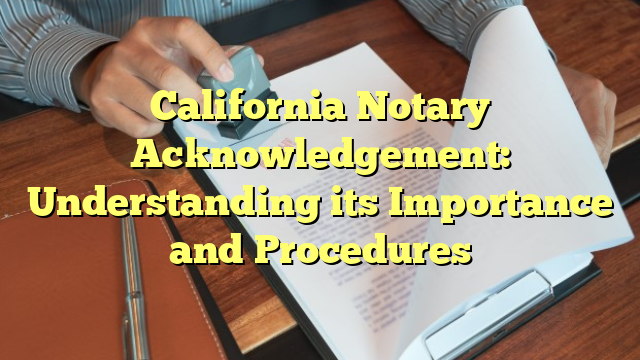In the state of California, notary acknowledgements play a vital role in validating the authenticity of important legal documents. Whether it’s a contract, deed, or power of attorney, a proper notary acknowledgement ensures the document’s credibility and protects the rights of all parties involved.
In this article, we will delve into the significance of California notary acknowledgements, the legal requirements, the process of obtaining an acknowledgement, and the key elements that make an acknowledgement valid. Notary Mobile App
Section 1: Understanding Notary Acknowledgements
1.1 Definition and Purpose:
A notary acknowledgement is a declaration by a notary public that a person voluntarily signed a document in their presence. It confirms the identity of the signer and ensures that they signed the document willingly and knowingly. The purpose of a notary acknowledgement is to provide an additional layer of authenticity and credibility to legal documents.
1.2 Importance in Legal Transactions:
Notary acknowledgements are crucial in various legal transactions, including real estate transactions, loan agreements, business contracts, and estate planning documents. They add an element of certainty and integrity, reducing the risk of fraud and disputes.
Section 2: Legal Requirements for California Notary Acknowledgements
2.1 California Notary Public Commission:
To perform notarial acts, including acknowledgements, in California, an individual must be appointed as a notary public by the California Secretary of State. Notaries must meet specific eligibility criteria, complete the necessary education and training, and pass a comprehensive exam.
2.2 Proper Identification:
When acknowledging a document, the notary public must verify the identity of the signer. Acceptable forms of identification include a driver’s license, state-issued ID card, passport, or other government-issued identification documents.
2.3 Physical Presence Requirement:
In California, the signer must be physically present before the notary public at the time of the acknowledgement. Remote online notarization is not currently permitted for acknowledgements in California.
Section 3: The Process of Obtaining a California Notary Acknowledgement
3.1 Step 1: Schedule an Appointment:
The signer should contact a qualified notary public and schedule an appointment to have the document acknowledged. Notaries can be found at banks, law offices, shipping centers, or by conducting an online search.
3.2 Step 2: Bring the Document and Identification:
The signer must bring the document requiring acknowledgement, along with valid identification documents, to the notary appointment. It’s essential to ensure the document is complete, with spaces left for the notary’s signature, seal, and the acknowledgement wording.
3.3 Step 3: Sign in the Notary’s Presence:
During the appointment, the signer must sign the document in the presence of the notary public. The notary will observe the signing and verify the identity of the signer.
3.4 Step 4: Notary Acknowledgement:
After the signer has signed the document, the notary public will complete the acknowledgement section. This includes adding their signature, official seal, and the required acknowledgement wording, which typically states that the signer appeared before the notary, acknowledged the document as their own, and signed it willingly.
3.5 Step 5: Notary Record-Keeping:
The notary public will maintain a record of the notarial act, including the date, type of document, names of the parties involved, and any relevant identification information. This record is crucial for future reference and may be required for legal purposes.
Section 4: Elements of a Valid California Notary Acknowledgement
4.1 Acknowledgement Wording:
A valid California notary acknowledgement must include the specific wording prescribed by state law. The wording typically includes the notary’s name, the county of their commission, the date of acknowledgement, and a statement affirming the signer’s identity and acknowledgment of the document.
4.2 Notary Signature and Seal:
The notary must sign the acknowledgement using their official signature, which matches the name on their commission. They must also affix their official seal or stamp on the document.
4.3 Completeness and Accuracy:
A valid acknowledgement must be complete and accurate, with no omissions or alterations. The document should be legible, and all required information should be clearly and properly filled out.
Section 5: Ensuring the Validity of a California Notary Acknowledgement
5.1 Following Legal Requirements:
To ensure the validity of a California notary acknowledgement, it is crucial to comply with all legal requirements, including proper identification, physical presence, and adherence to the specific wording and procedures outlined by state law.
5.2 Choosing a Qualified Notary Public:
Selecting a qualified and reputable notary public is essential. Look for a notary who is currently commissioned, experienced, and knowledgeable about California notary laws and practices.
5.3 Document Review:
Before signing and seeking notarization, carefully review the document to ensure its accuracy, completeness, and compliance with legal requirements. Any errors or missing information should be addressed before the notarization process.
Conclusion:
In California, notary acknowledgements are an integral part of legal transactions, providing authenticity and credibility to important documents.
By understanding the legal requirements, following the proper procedures, and working with a qualified notary public, individuals can ensure the validity and effectiveness of their California notary acknowledgements.
Whether in real estate, business, or personal matters, a properly executed notary acknowledgement offers peace of mind and strengthens the legal integrity of important transactions.
